
The International Court of Justice, sometimes known as the World Court, is one of the six principal organs of the United Nations (UN). It settles disputes between states in accordance with international law and gives advisory opinions on international legal issues. The ICJ is the only international court that adjudicates general disputes between countries, with its rulings and opinions serving as primary sources of international law.
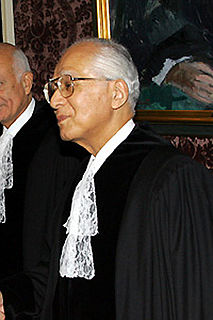
Hisashi Owada is a Japanese former jurist, diplomat and law professor. He served as a judge on the International Court of Justice from 2003 until June 7, 2018, and was President of the Court from 2009 to 2012. He is the father of Empress Masako and the father-in-law of the incumbent Emperor of Japan, Naruhito.
Abdul Gadire Koroma is a Sierra Leonean jurist who served two terms as judge at the International Court of Justice.

United Nations Security Council resolution 805, adopted unanimously on 4 February 1993, after noting the death of International Court of Justice (ICJ) judge Manfred Lachs on 14 January 1993, the Council decided that elections to the vacancy on the ICJ would take place on 10 May 1993 at the Security Council and at a meeting of the General Assembly during its 47th session.
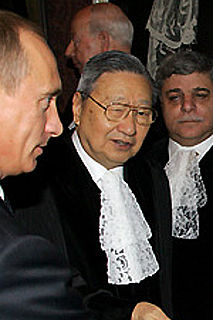
United Nations Security Council Resolution 1914, adopted unanimously on 18 March 2010, after noting the resignation of International Court of Justice (ICJ) judge Shi Jiuyong and that the vacancy must be filled in accordance with the Statute of the ICJ, the Council decided that the election to fill the vacancy would take place on 29 June 2010 at a meeting of the Security Council and at a meeting of the General Assembly at its 64th session.

United Nations Security Council resolution 951, adopted without a vote on 21 October 1994, after noting the death of International Court of Justice (ICJ) judge Nikolai Konstantinovitch Tarassov on 28 September 1994, the Council decided that elections to the vacancy on the ICJ would take place on 26 January 1995 at the Security Council and at a meeting of the General Assembly during its 49th session.

United Nations Security Council resolution 1018, adopted unanimously on 7 November 1995, after noting the death of International Court of Justice (ICJ) judge Andrés Aguilar-Mawdsley on 24 October 1995, the Council decided that elections to the vacancy on the ICJ would take place on 28 February 1996 at the Security Council and at a meeting of the General Assembly during its 50th session.
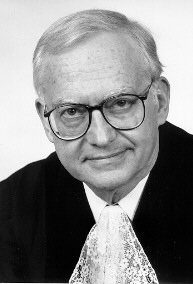
United Nations Security Council resolution 1278, adopted without a vote on 30 November 1999, after noting the resignation of International Court of Justice (ICJ) judge Stephen M. Schwebel taking effect on 29 February 2000, the council decided that elections to the vacancy on the ICJ would take place on 2 March 2000 at the security council and at a meeting of the General Assembly during its 54th session.

United Nations Security Council Resolution 1926, adopted unanimously on June 2, 2010, after noting the resignation of International Court of Justice (ICJ) judge Thomas Buergenthal with effect from September 6, 2010. The Council decided that the election to fill the vacancy would take place on September 9, 2010 at a meeting of the Security Council and at a meeting of the General Assembly.
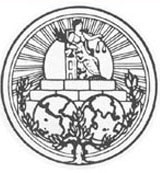
United Nations Security Council resolution 1361, adopted without a vote on 5 July 2001, after noting the resignation of International Court of Justice (ICJ) judge Mohammed Bedjaoui taking effect on 30 September 2001, the council decided that elections to the vacancy on the ICJ would take place on 12 October 2001 at the security council and at a meeting of the general assembly during its 56th session.
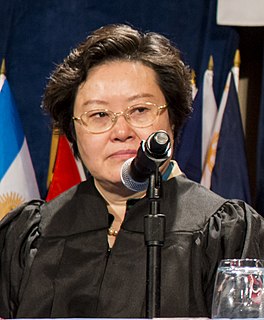
Xue Hanqin is a Chinese jurist at the International Court of Justice. On 29 June 2010, she was elected to fill the vacancy created by Shi Jiuyong's resignation on 28 May 2010. She is one of three female judges serving on the International Court of Justice (ICJ) and one of only four women elected as members of the Court to date. Xue is the fifth Chinese judge at the ICJ, and the third representing the People's Republic of China.

Julia Sebutinde is a Ugandan judge serving her second term on the International Court of Justice following her re-election on November 12, 2020. She also is the current chancellor of Muteesa I Royal University a university owned by Buganda kingdom. She has been a judge on the court since March 2012. She is the first African woman to sit on the ICJ. Before being elected to the ICJ, Sebutinde was a judge of the Special Court for Sierra Leone. She was appointed to that position in 2007.
The 2011 International Court of Justice election began on 10 November 2011 at United Nations Headquarters in New York City. In the set of triennial elections, the General Assembly and the Security Council concurrently elect five judges to the Court for nine-year terms, in this case beginning on 6 February 2012. From the eight candidates, the five winners were Giorgio Gaja (Italy), Hisashi Owada (Japan), Peter Tomka (Slovakia), Xue Hanqin (China) and Julia Sebutinde (Uganda).

Leonardo Nemer Caldeira Brant is a Brazilian jurist and International law scholar, who has been a judge of the International Court of Justice since 4 November 2022. He is also a professor at the Federal University of Minas Gerais (UFMG) and the founder of the International Law Center (CEDIN), in Belo Horizonte.
The 2014 International Court of Justice election began on 6 November 2014 at United Nations Headquarters in New York City. In the set of triennial elections, the General Assembly and the Security Council concurrently elect five judges to the Court for nine-year terms, in this case beginning on 6 February 2015.
The 2017 International Court of Justice election began on 20 November 2017 at the United Nations Headquarters in New York City. In the set of triennial elections, the General Assembly and the Security Council concurrently elect five judges to the Court for nine-year terms, in this case beginning on 6 February 2018. From the seven candidates, the five winners were Abdulqawi Yusuf (Somalia), Antônio Augusto Cançado Trindade (Brazil), Nawaf Salam (Lebanon), Ronny Abraham (France) and Dalveer Bhandari (India).
The 2020 International Court of Justice election were held on 11 and 12 November 2020 at the United Nations Headquarters in New York City. In the set of triennial elections, the General Assembly and the Security Council concurrently elect five judges to the Court for nine-year terms, in this case beginning on 6 February 2021. From the eight candidates, Yuji Iwasawa (Japan), Xue Hanqin (China), Peter Tomka (Slovakia), Julia Sebutinde (Uganda), and Georg Nolte (Germany) have been elected members of the International Court of Justice for a term of office of nine years, as both the Security Council and the General Assembly have agreed on the same candidates.
The 2018 International Court of Justice election was held on 22 June 2018 at the United Nations Headquarters in New York City. The General Assembly and the Security Council concurrently elected Yuji Iwasawa (Japan) to the International Court of Justice until 5 February 2021. He served the remainder of the nine-year term of office that had been held by Hisashi Owada (Japan), whose resignation from the Court took effect on 7 June 2018.
The 2021 International Court of Justice election was held on 5 November 2021 at the United Nations Headquarters in New York City. The General Assembly and the Security Council concurrently elected Hilary Charlesworth (Australia) to the International Court of Justice for remainder of the nine-year term of office that had been held by Judge James Crawford (Australia).

Paulo Borba Casella is a Brazilian professor of international law at the University of São Paulo. He specialises in International and comparative law, and human rights. He has lectured at The Hague Academy of International Law.












